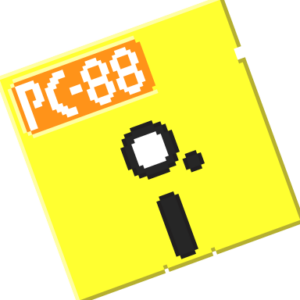PC-88
Featuring a 4MHz Z80A-compatible processor and a 640×200-pixel, 8-color display, the PC-8801 was twice as fast as the PC-8001, with eight times as many pixels and up to four times as much RAM. However, the biggest selling point was its backwards compatibility with PC-8001 software, providing a smooth upgrade path for customers who had already bought into the NEC ecosystem. Games were not the primary focus, as NEC intended to sell its high-end 8-bit machine to a whole spectrum of customers ranging from computer enthusiasts to small businesses and educational institutions. Major models: – PC-8801 (November 1981). Original model. – PC-8801mkII (November 1983). Minor upgrade over original model. Built-in floppy disk drives. – PC-8801mkIISR (January 1985). Graphics significantly upgraded with the introduction of a new V2 mode, and built-in FM synthesis using a YM2203 (OPN) chip. This model marks the repositioning of the PC-8801 as a system for hobbyists and gamers. – PC-8801FH (November 1986). CPU upgraded to 8MHz, but switchable to 4MHz for compatibility. A sleek jet-black model was also available. – PC-88VA (March 1987). Featuring a 16-bit CPU, up to 65536 colors, a video processor providing hardware-based scrolling and spriting, and a custom OS, the PC-88VA was a powerhouse of a system that was unfortunately plagued by compatibility problems, and ultimately overshadowed by the Sharp X68000. Although technically part of the PC-8801 series, it’s best to think of the PC-88VA as a completely separate system. – PC-8801FA (October 1987). Audio upgraded to the Yamaha YM2608 (OPNA) FM synthesis chip. Older models could also be upgraded to OPNA by purchasing the Sound Board II expansion board. – PC-98DO (June 1989). A hybrid computer that could switch between PC-8801 and PC-9801 modes. – PC-8801MC (November 1989). Included a built-in CD-ROM drive, but very few games took advantage of it.

